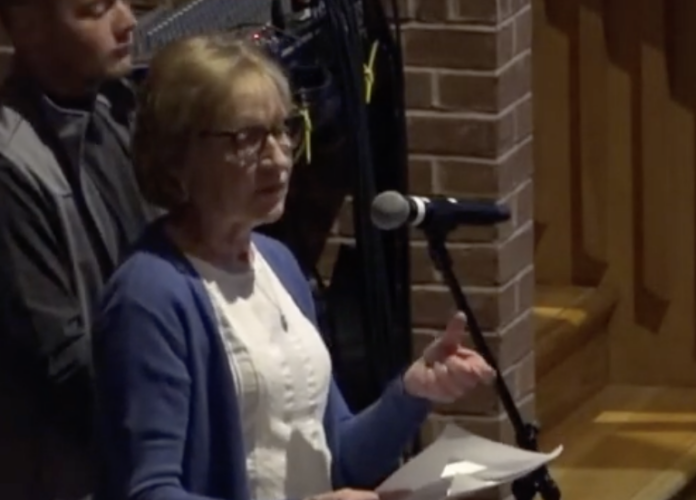GLOCESTER – Glocester taxpayers got a preview of the upcoming town budget at a recent hearing held at Ponaganset High School. The proposed municipal budget amounts to $9,107,526, an increase of $167,507 or 2 percent, over this year’s $8,940,019. The Glocester schools budget request is $12,295,102, an increase of $806,989, or 7.02 percent over the previous year of $11,488,113.
There were many questions, particularly from longtime budget board member David Steere, who pointed out problems, particularly with the local schools’ budget. Those included everything from unexplained additions to the fiscal plan to what appeared to be a 23 percent raise for Supt. Renee Palazzo.
“It would have been nice if the budget was submitted at least to the budget board in a timely manner where we could take a look at it and ask some questions,” said Steere. “It might not have changed anything, but it would have made it clearer to us anyways, what you were asking for.”

Steere pointed out that the school district has already spent $1 million more than their budget for the current year. The adopted budget for 2023-24 was $10,788,528, while the actual amount spent was $11,852,865. The revenue, however, was $500,000 plus more than anticipated. The bottom line, Steere said, was a deficit of $357,495.
“That’s the second year in a row for the deficit,” said Steere.
For the current year, he added, the operating expenses are $11,488,113, which is $364,000 less than what expenses were for 2024.
“That’s a signal that you might be in a little bit of trouble,” said Steere.
He then pointed out a line item in the school budget for “transfer from fund balance” of $300,000.
“The problem is you don’t have $300,000 to transfer,” said Steere. “You’ve got $168,000. So, once again, that’s putting you in the hole before you even get started. I don’t know if you are looking at a deficit again, or whether there’s a positive, a small positive, I don’t know. That’s something you folks probably should share with everybody tonight if you can.”
Steere also pointed out that the Budget Board can not make changes to the school budget, and that the document submitted for the hearing was not the one that had been previously submitted to budgeters. The one submitted to the budget board actually had an appropriation increase in excess of $2 million, while the new request showed an increase of $1,242,217.
“Even if the Town Council said we were going to give everything to the School Committee, it is not that kind of money,” he said. “There’s just not that kind of money we can give to the School Committee.”
The district’s proposal shows an operating expenses increase of $806,000, and $305,000 in revenues projected.
By state law, towns cannot increase their levy by more than 4 percent.
Steere questioned several areas, including a sudden $430,000 for bus transportation, which he said was never budgeted previously. If the budget had been submitted to the board in a timely manner, he said, then maybe the committee could have explained why this suddenly appeared out of nowhere.
Another sticking point was $63,000 budgeted for Northwest Special Services, which he said was not included in budgets in recent years. Steere said the last time the expense was budgeted was for 2023-24 at a cost of $28,215.
“I don’t know, it could have been a good number,” Steere said. “It would have been nice to ask.”
Other discrepancies he pointed out included a line item of “Tuition, non-public day,” budgeted for $360,000. The last year that expense was budgeted was in the 2023-2024 budget for $18,000.
The superintendent was budgeted for what was listed as a 23 percent raise as well.
Steere said that in the future, it would be a good idea for the committee to submit their budget in time to answer questions the budget board might have, but to also explain the increases and answer any questions taxpayers might have.
“I think in the future it’d be a good idea if at a public hearing such as this that the committee not only submits their budget in a timely manner but goes through their budget so everybody has a very good understanding of what’s in your budget and how the money is being spent.”
When the time came, Glocester School Committee member Beth Keeling spoke, explaining how the schools have been spiraling over the course of recent years.
“The story of our elementary schools mess began 15 years ago, when the state legislature recalculated the school funding formula for Rhode Island schools,” she said. “Unfortunately, Glocester was one of the districts which lost state aid over a 10 year period.”
After meeting with the committee at the time, she recalled, the council agreed to give money to the schools to help make up for the loss of state aid under certain conditions, including that the funding did not go toward the town’s maintenance of effort. Under Rhode Island law, maintenance of effort means that municipalities must contribute an amount not less than its local contribution for schools in the previous fiscal year.
The committee made efforts to reduce costs by changing and reducing bus routes, moving students to different schools, and seeking help from the local Department of Public Works with paving projects and other maintenance.
“We did everything we could to mitigate the loss of state aid,” said Keeling. “The budget did work for awhile. We managed to get through each year; however, now that we’ve hit this point with money not going to maintenance of effot and no longer having a fund balance, we’re in this trouble.”
She recalled Steere getting up and telling the council two years ago that the schools needed money. That year, they had asked for a 2.82 percent increase and received 0.55 percent, she said. Enrollment has remained the same and staff numbers have remained the same.
“If we are to cut staff members, then children fall behind, and children fall behind at the elementary level,” she added.
Teachers agreed to take a 0 percent raise over six years to help, said Keeling. Four times in 15 years they received a 3 percent raise. The other seven years was a 2 percent increase or less.
“The teachers are not the cause of this problem, and, certainly, the teacher assistants aren’t either,” said Keeling.
Funded and unfunded mandates from the state have effected the district as well. The DCYF took custody of one Glocester child, placed that child in an out of district residential program and charged the schools $93,000.
“That will be a continued expense until that child is 22,” Keeling said. “There is no way we can appropriately budget for those types of things because we have no way of knowing what is coming our way.”
As a result of all these issues, she said, the district has a “perfect storm”: decreased fund balance, unexpected and unfunded state mandates and reduced state aid. Those items amounted to approximately $750,000, according to Committee member Amy Ferreria.
“If money had gone to maintenance, we would not be here asking, begging, for your help,” said Keeling. “None of us wants to decimate the schools. We look forward to working with you to resolve these most difficult issues.”
When asked about the raise for Palazzo, Keeling said the line item included professional development, stating that Palazzo was not getting a raise, even though it appeared she was.
Previous longtime school committee member Walter Steere pointed out that, according to the Town Charter, the schools were prohibited from overspending their budgeted amounts without approval from the taxpayers at a financial town meeting called for that reason. Steere said the schools had over spent close to $1.5 million without that approval.
“So that money that was spent was without approval of the taxpayers and that’s how we ended up with the problem we are in with the schools,” he said.
The first year was a surprise, he agreed, but something should have been done the second year to solve the problem. He also pointed out areas, such as substitute expenses, which were mistakenly left out, along with other expenses.
“You should have come back to the taxpayers for more money,” said Steere, “I don’t know where this is going to wind up. The town can’t spend over 4 percent. I don’t know where the money would come from.”
David Steere pointed out that money that came from the Northern Rhode Island Collaborative totaled $1,325,471 and was put in a non-spending account. In the 2023 audit, the non-spendable account was zero.
“So, what happened to that money?” he asked. “Whether the School Committee voted on it or not, it got moved into a restricted account. They used $566,498 to close the gap in the deficit for 2023. Then, they used $357,495 to close the deficit in 2024, and that left them with what you have in 2025.”
As far as the municipal side of the budget was concerned, the biggest item was a request for $3,264,700 for capital expenses, which the board reduced to $655,800. Capital expenses are limited to 2 percent of the operating expenses, which is the amount the board projected and approved.
“Not everybody is getting what they want,” Steere said.
He said the board proposed setting aside $25,000 a year for a projected roof replacement at the senior center in the future. In addition, $100,000 is set aside for rewiring of the police station. The Emergency Management Agency has received a $1 million grant that requires 33 percent in matching funds, so $330,000 was included for that item. The remaining $208,000 is set aside for paving. No surplus, added Steere, is being used for projects.
The fund balance was another concern. Steere pointed out that in 2024 the fund balance amounted to $5,168,470. The town used $218,000 during this fiscal year, dropping the balance to $4,958,000 or 14 percent of operating expenses. In 2021, the fund balance was 19.7 percent, and the Town Charter requires 12 percent.
“This is not trending in a good way,” he said.
Other items included a decrease in the town clerk’s budget of $1,349, as well as increases in wages for non-union employees of 2 percent and DPW of 4 percent. Most departments showed either decreases or slight increases. Negotiations are currently underway with unions representing the town’s police, dispatchers and clerks. Funds have been set aside for those increases, but it is not yet clear how much of an increase will be approved.
The formal vote on the budget will take place on Tuesday, May 20 at the Glocester Senior Center.








